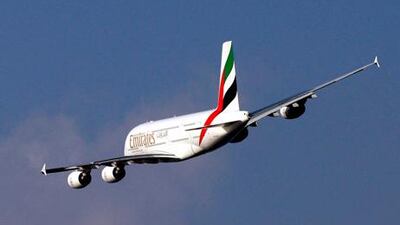The late delivery of new Airbus A380s has forced Emirates Airline to push back by two months work to fix potential wing cracks on its existing fleet of superjumbos.
Wing modification work on Emirates' fleet of A380s should have started in March, but has only begun this month because of late arrival of new aircraft, according to Tim Clark, the president and chief executive of Emirates. "We need to receive the new aircraft to backfill the fleet and maintain the route network when we release [our existing] A380s for modification," Mr Clark told the leading aviation journal, Flight International. "There's been quite a long delay driven by the lateness of delivery of the new aircraft."
Mr Clark was speaking as Emirates received its 32nd A380 almost six weeks late. Three more are in the delivery process in Toulouse.
The European Aviation Safety Agency had ordered modifications to the A380 wings after cracks on some of the airliners in service were discovered 18 months ago.
The cracks, which did not directly affect the airworthiness of the airliner, were on brackets that attach the A380's wing ribs - the frames that run along the width of the wing - to the wing's metal skin. The cracks were caused by stresses generated during manufacturing and exacerbated by the flexing of the wings during flight.
All 100 A380s in service are affected by the order. At the end of last year Airbus stated that modification work on A380s already on the production line was likely to affect the smooth performance of its delivery target of 30 A380s a year. It said it had already taken a €200 million (Dh942.7m) hit from costs related to repairing cracks and at the end of last month, the company had an order backlog of 151 A380s to deliver.
In total, 34 Emirates' A380s will undergo the repairs over the next 18 months, four aircraft at a time. The wing modification involves the replacement of some of the aircraft's composite structure with metal parts, which will make the aircraft heavier and add to its fuel consumption.
The work was due to take about 20 months and be completed by November next year. Although the programme has started two months late, Mr Clark said that target was still achievable.
"We estimated the downtime is eight weeks, but Airbus hopes it will be able to do it in six. So Airbus is relatively optimistic that it can recapture the timeline after this delay at the front end, by shrinking the time it takes to do the job," he said.
"It's not our responsibility. Airbus takes the aircraft, modifies, certifies them and brings them back to us," Mr Clark added.
Last week EADS, Airbus's parent company said profits nearly doubled on a 9 per cent rise in revenue in the first quarter on strong demand and higher prices for commercial jets. So far this year, the company has booked no new orders for the aircraft.

